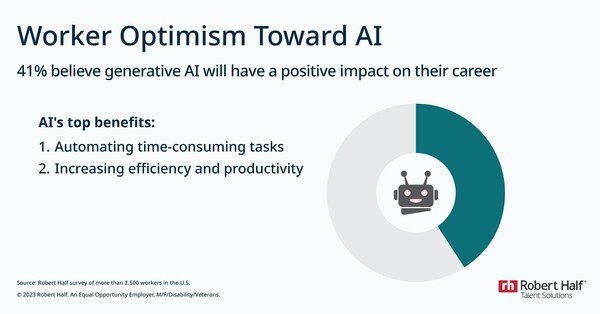TL;DR:
- Generative AI instills optimism among professionals about their skills and careers.
- 41% of surveyed workers believe generative AI will positively impact their careers.
- 14% are concerned about the potential obsolescence of their skills due to AI.
- 26% anticipate minimal impact from generative AI on their careers.
- Technology and HR professionals foresee increased demand for their skills due to AI.
- Gen Zers and Millennials are more optimistic about AI’s benefits than Gen Xers and Baby Boomers.
- Clear guidelines and openness to AI’s potential are crucial for successful integration.
- Generative AI offers benefits like automating tasks (35%) and increasing efficiency (30%).
Main AI News:
The Transformative Power of Generative AI in Shaping Career Trajectories
Generative AI, a groundbreaking innovation, is instilling a sense of optimism among professionals regarding their competencies and career trajectories, according to a recent study conducted by Robert Half, a prominent talent solutions and business consulting firm. This in-depth research, encompassing the perspectives of over 2,500 American workers, illuminates a significant trend – a staggering 41% of the respondents firmly believe that generative AI is poised to bestow a positive impact on their career paths. This perspective stands in contrast to the apprehensions of a more reserved 14% who express concerns about its potential to render their skills obsolete. Meanwhile, a notable 26% of the participants anticipate that generative AI will exert minimal influence on their vocational journey.
Segmented Insights: Occupation and Generation Dynamics
Analyzing the responses through the prism of occupational categories and generational cohorts, compelling patterns emerge. Professionals within the technology domain (63%) and human resources (54%) confidently anticipate that generative AI will catalyze a heightened demand for their specialized proficiencies. A generational variance also surfaces, with Generation Z members (63%) and Millennials (57%) emerging as enthusiastic proponents of the benefits offered by AI, contrasting with the more reserved perspectives of Generation X (30%) and Baby Boomers (21%). These dynamics shed light on the interplay between evolving technologies and varying attitudes within the workforce.
Navigating Uncertainty: Perspectives from Industry Visionaries
Trisha Plovie, a distinguished figure in the realm of workforce foresight and the Senior Vice President of Future of Work at Robert Half, provides contextual insight into this transformative landscape. She underscores the natural inclination of workers to scrutinize the impending impact of generative AI on their immediate and long-term employability. Plovie emphasizes that the current imperative is for both employees and employers to prioritize comprehending the scope, benefits, and potential risks intrinsic to this emerging technological paradigm.
The Path Forward: Integrating Generative AI into Professional Realms
Robert Half’s extensive research underscores the multitude of benefits that generative AI promises to unleash within professional contexts. A significant 35% of respondents recognize its potential in automating laborious tasks, resulting in a notable elevation of productivity. Furthermore, 30% of participants attest to the efficiency-boosting capabilities that generative AI brings to the forefront. This corroborates the transformational potential that generative AI holds within the workforce.
Industry-Wide Embrace: Pioneering Generative AI Integration
As organizations increasingly recognize the potential of generative AI, a paradigm shift is underway. A supplementary survey conducted by Robert Half reveals that managerial perspectives mirror employee sentiments. Acknowledging the technology’s multifaceted advantages, businesses are leveraging generative AI across diverse operational domains. Trisha Plovie reiterates the pivotal role of embracing generative AI within the workplace, underlining the necessity for well-defined guidelines and receptivity to its capacity to alleviate routine tasks, amplify productivity, and create space for strategic undertakings.
Conclusion:
The survey conducted by Robert Half indicates a widespread sense of optimism among professionals regarding the positive impact of generative AI on their careers. As technology evolves, organizations must carefully navigate the integration of AI technologies to harness their benefits while addressing potential concerns. This trend underscores the need for strategic planning and upskilling to embrace the transformative potential of AI in the evolving job landscape.

